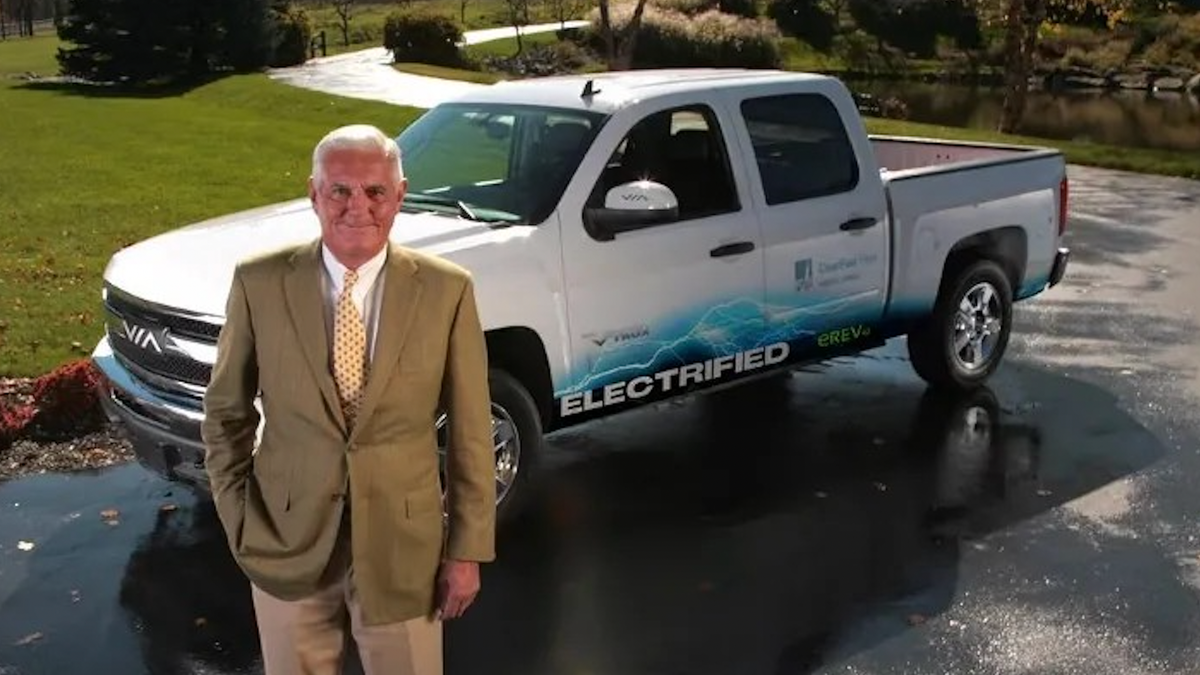Bob Lutz is undoubtedly a pioneer in the automotive world, but sometimes even the greats get it wrong. Sometimes they get it so wrong the product they come up with is downright irrelevant and is forgotten by the annals of time. Take the Via Motors VTrux. Do you remember the VTrux? Me neither, but Big Bob was behind it over a decade ago, and thanks to YouTuber and friend of the show Aging Wheels, we are able to get an up-close look at what this foreign truck was all about.
What we’ve got here with the VTrux is actually something that’s a bit ahead of its time since it is a plug-in hybrid pickup truck that debuted all the way back in 2011. That’s over a decade before vehicles like that would start to hit the mass market. Hell, Chevy didn’t come out with an electric Silverado until a few months ago. Basically what Via and Lutz did was take a bone-stock Chevy Silverado, Express or Suburban, rip out a whole of of its mechanical guts, and stick a series hybrid system in them. It sounds good on paper for sure, but they never really caught on because of high prices and lackluster performance. I see the vision, but the technology just wasn’t there yet in 2011.
Robert Dunn of Aging Wheels ended up with the VTrux after a viewer asked him to help fix is ailing truck despite the fact it had relatively low miles and wasn’t very old. After just a few years, the VTrux wasn’t able to live up to Via’s promises.
Dunn goes into a fairly deep explanation of how Via takes a normal Silverado and turns it into a VTrux. Basically, the company bought a thousand-ish half-ton base Silverados with the 4.3-liter Vortec V6 that puts out 297 horsepower and 330 lb-ft of torque. Via then removed the transmission, and in its place, it put a 201 horsepower electric generator and an electric motor that makes 254 horsepower and 306 lb-ft of torque. Via then bolts a cleverly packaged 24 kWh battery back behind those components. All in all, this setup is somehow less powerful than the 4.3-liter V6 on its own. That’s some impressive work. Via claimed that the truck could do 0-60 in 9.7 seconds, but that never really happened. A few years later, and the truck is even slower.
Dunn goes on to explain how it works. Basically, the V6 acted as a gas generator, which drove the electric generator behind it. That electric generator then added power to the batteries and provided power to the 120-volt and 140-volt plugs out back. The aforementioned electric motor – living where the transmission used to be – connected to the transfer case, which spins the driveshaft into a differential and eventually reaches the wheels. While sort of neat, this was not exactly an efficient design. There’s a reason automakers try to put the electric motors as close to the drive wheels as possible.
All of this janky electrical goodness did not come cheap. First, you had to get a 2014 Silverado WT which cost over $50,000 in today’s money. Then you add all of the VTrux bits, and suddenly you’ve got a 2014 base Silverado that costs $76,000 – nearly $101,000 today. DAMN.
This whole setup was initially advertised with 40 miles of pure EV range and up to 400 miles of combine range, but after 10 years and 47,000 miles, the Via Dunn tested can’t get close to those numbers. He found that even though the gas engine isn’t driving the wheels, it still revs up and down seemingly randomly, meaning fuel economy with the engine running is barely better than a regular Silverado. It also was only getting about 20 miles of electric range. Brutal. He noted that the battery wasn’t able to put out full power for a very long time, meaning that you’ll actually lose some speed if you’re driving up a hill.
Even at the best of times, this conversion was sort of janky. Dunn pointed out a whole lot of stuff left over from before the truck was converted like cruise control buttons that don’t worry, gearchange buttons on the column that do nothing and the fact the truck’s onboard computer sometimes freaks out and doesn’t know what’s going on.
The Via VTrux is certainly an interesting piece of automotive history, but it was far from Bob Lutz’s best effort.

